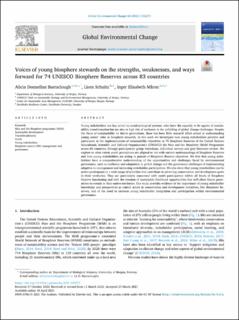| dc.contributor.author | Barraclough, Alicia May Donnellan | |
| dc.contributor.author | Schultz, Lisen Paula | |
| dc.contributor.author | Måren, Inger Elisabeth | |
| dc.date.accessioned | 2022-04-11T11:07:28Z | |
| dc.date.available | 2022-04-11T11:07:28Z | |
| dc.date.created | 2021-04-22T13:46:15Z | |
| dc.date.issued | 2021 | |
| dc.identifier.issn | 0959-3780 | |
| dc.identifier.uri | https://hdl.handle.net/11250/2990904 | |
| dc.description.abstract | Young stakeholders are key actors in social-ecological systems, who have the capacity to be agents of sustainability transformation but are also at high risk of exclusion in the unfolding of global change challenges. Despite the focus of sustainability on future generations, there has been little research effort aimed at understanding young actors’ roles as biosphere stewards. In this work we investigate how young stakeholders perceive and participate in the implementation of sustainability objectives in 74 Biosphere Reserves of the United Nations Educational, Scientific and Cultural Organization’s (UNESCO) the Man and the Biosphere (MAB) Programme across 83 countries, through participatory group workshops, individual surveys and grey literature review. We explore to what extent youth perceptions are aligned or not with current understandings of Biosphere Reserves and how young stakeholders are acting in pursuit of Biosphere Reserve objectives. We find that young stakeholders have a comprehensive understanding of the opportunities and challenges faced by environmental governance, such as resilience and adaptation to global change and the governance challenges of implementing adaptive co-management and increasing stakeholder participation. We also show that young stakeholders can be active participants in a wide range of activities that contribute to achieving conservation and development goals in their territories. They are particularly concerned with youth participation within all levels of Biosphere Reserve functioning and with the creation of sustainable livelihood opportunities that will allow future generations to remain in their native territories. Our study provides evidence of the importance of young stakeholder knowledge and perspectives as central actors in conservation and development initiatives, like Biosphere Reserves, and of the need to increase young stakeholder integration and participation within environmental governance. | en_US |
| dc.language.iso | eng | en_US |
| dc.publisher | Elsevier | en_US |
| dc.rights | Navngivelse 4.0 Internasjonal | * |
| dc.rights.uri | http://creativecommons.org/licenses/by/4.0/deed.no | * |
| dc.title | Voices of young biosphere stewards on the strengths, weaknesses, and ways forward for 74 UNESCO Biosphere Reserves across 83 countries | en_US |
| dc.type | Journal article | en_US |
| dc.type | Peer reviewed | en_US |
| dc.description.version | publishedVersion | en_US |
| dc.rights.holder | Copyright 2021 The Author(s) | en_US |
| dc.source.articlenumber | 102273 | en_US |
| cristin.ispublished | true | |
| cristin.fulltext | original | |
| cristin.qualitycode | 2 | |
| dc.identifier.doi | 10.1016/j.gloenvcha.2021.102273 | |
| dc.identifier.cristin | 1905863 | |
| dc.source.journal | Global Environmental Change | en_US |
| dc.relation.project | Norges forskningsråd: 280299 | en_US |
| dc.identifier.citation | Global Environmental Change. 2021, 68, 102273. | en_US |
| dc.source.volume | 68 | en_US |

